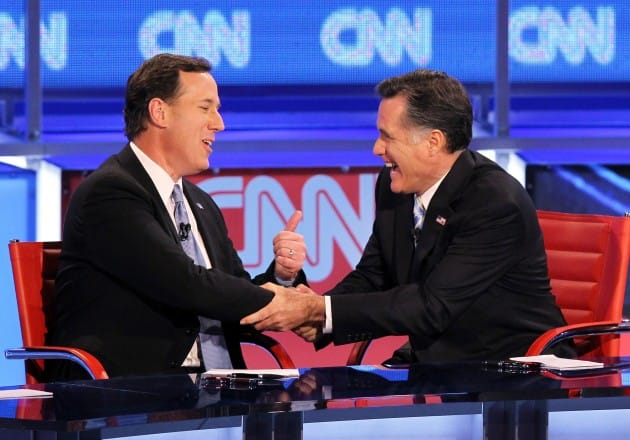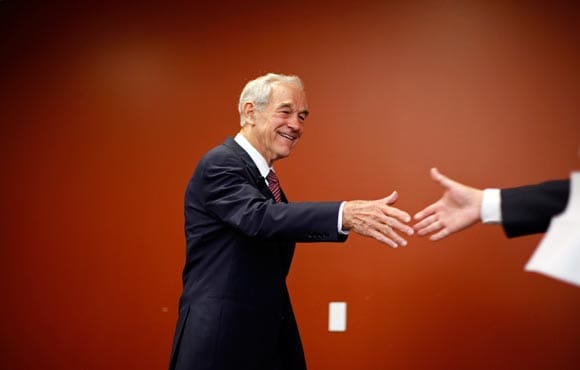Do GOP Candidates Control Their Delegates?


On Lawrence O’Donnell's MSNBC show last week, spokespersons for Gingrich's Super PAC, the Santorum Campaign, and MSNBC Analyst Steve Schmidt, most recently portrayed by Woody Harrelson in HBO's movie Game Change, all stated that other than possibly Dr. Ron Paul no campaign is in complete command of “its” delegates. One of the basic tenets of being a viable candidate for President is to have a competent delegate whip structure, which in turn leads to delegate vetting. In the Democratic Party, the rules require the candidates choose their delegates. For Democrats, “going rogue” is very difficult to do given the vetting and whip process prior to, and during, a national convention.
Dynamics are much more complicated for Republicans. This issue became even more important in light of this week’s Republican primary and caucuses. Alabama and Mississippi produced wins for former Sen. Santorum, while caucuses in Hawaii were a victory for former Gov. Romney. The upcoming Illinois primary, while touted as a marquee race, is another example of Sen. Santorum’s organizational campaign flaws. As the case in Ohio, Sen. Santorum has already forfeited 10 delegates in Illinois to Gov. Romney. In fact, had Gov. Romney's campaign been more aggressive, he could have forced Sen. Santorum to forfeit delegates in 10 of the 18 Illinois congressional districts.
Sen. Santorum will, however, appear on Illinois’ statewide presidential preference ballot in the March 20 primary, commonly considered a "beauty contest". While Illinois awards 54 delegates divided among 18 congressional districts by sets of 2 to 4, 15 additional delegates will be chosen by party officials and will go to the convention unbound.
In Illinois, candidates must collect 600 signatures in each congressional district to present full “slates,” or lists of delegates, on the primary-day ballot in each district. In addition to voting on presidential candidates, Illinois voters elect their delegates. On the ballot, next to each delegate candidate’s name, is the name of the presidential candidate they support. In four congressional districts, there are no delegates listed as supporting Sen. Santorum. His campaign did not file slates in the state’s 4th, 5th, 7th, and 13th Congressional Districts. This is critical, as the 4th, 5th, and 7th Congressional Districts are inner city Illinois, which might actually vote for Sen. Santorum. The 13th District, which stretches from Central to Southern Illinois, was a likely win for the former senator.
The Illinois Republican Party itself has been badly fractured for some time between a traditional business establishment wing and a social conservative wing. US Senator Mark Kirk and Illinois State Treasurer Dan Rutherford are at the heart of Team Romney in Illinois. On the extreme right wing are former State Representatives Al Salvi and Peggy Pullen, who are the operation behind Sen. Santorum's Illinois effort.
To reemphasize the point from Ohio, a Romney spokeswoman commented to Washington Post blogger Jennifer Rubin, “The fact that Sen. Santorum cannot execute the simple tasks that are required to win the Republican nomination raises questions about his capacity to take on President Obama’s formidable political machine, much less to run the country.” Rubin noted:
"She’s got a point. The Santorum team has continually boasted that it is doing great for a tiny team with much less money. But this is not a selling point for his readiness for the general election. Do Republicans really want to entrust their nomination and chances of booting President Obama from the White House to the gang that couldn’t get its act together?And it is not as if the campaign has bulked up since then. In fact, it spokesman bragged that “we will never be the bureaucratic behemoth the Romney campaign is.” That would be the campaign that managed to get on every ballot and out-fundraise Santorum.What was endearing in Iowa (when he was one guy, in a pickup with no media) is now problematic and reason to conclude he hasn’t put together an organization deft enough to win the nomination. That’s not a good sign for a guy running for chief executive of the entire country.”
To add to the intrigue and finger pointing, BuzzFeed's Zeke Miller asserts that Romney's grasp on the state could be in jeopardy due to his campaign's ineptitude led by Romney For President State Chair Dan Rutherford "taking his foot off of Santorum's throat" by withdrawing challenges to the former Pennsylvania Senator's late inclusion on the Illinois ballot. The article asserts:
"But Illinois Treasurer and Romney state chairman Dan Rutherford withdrew challenges in those districts, allowing Santorum the opportunity to win 30 delegates he would have missed out on.The decision produced a quiet storm of outrage among Romney's allies in the state, who were bewildered by the decision to make a slam-dunk race competitive, and to grant an opening in the desperate scramble to reach the 1,144 delegates required for the Republican nomination."When there is a challenge filed because a campaign doesn't file the required number of signatures, it’s pretty much a no brainer," said a senior Romney supporter in Illinois. "The conservative folks started screaming bloody murder, and Rutherford caved.""This isn't about Romney, it’s about Rutherford," he said. “Rutherford is thought to be planning to seek his party's nomination for governor in 2014, and Romney's other local allies accuse him of putting his interests above the candidate's, and ingratiating himself to Santorum-supporting conservative activists.”
Three final observations are in order.
Interesting Dynamics in Puerto Rico
Gov. Romney has crushed Sen. Santorum in places that do not have electoral votes, namely US territories such as Guam, American Samoa, the Virgin Islands, and the Northern Mariana Islands. In those places, Gov. Romney will end up netting close to 40 delegates. As if to play catch up, Sen. Santorum is now campaigning in Puerto Rico, however realistically, Gov. Romney has the entirety of the Republican apparatus down there supporting him. Gov. Romney is likely to get most of the 23 delegates at stake.
Immigration may become an issue in Puerto Rico, though all resident Puerto Ricans are US Citizens. Supreme Court Justice Sonia Sotomayor, appointed by President Obama, is of Puerto Rican lineage and is considered the pride of Puerto Rico. It could be interesting to hear discussions of “activist judges” as the local reaction could be less than warm.
Puerto Rico has a modified winner-take-all approach. Of the commonwealth’s 23 delegates on offer, 20 will go to the candidate who wins more than 50 percent of Sunday’s vote. That leaves three super delegates left and two have already endorsed Gov. Romney, including Puerto Rico Gov. Luis Fortuno. The third super delegate is backing Speaker Gingrich. If none of the candidates win a majority of the vote, the delegates will be allocated proportionally.
Turnout in Sunday’s primary will be high – some projections hover around 400,000, easily dwarfing contests held in Hawaii (4500) and American Samoa (70). However, Puerto Rico hosts an open primary. Following Operation Hilarity in Michigan, Democrats, organized labor and women’s groups are mobilizing to get people to vote for Sen. Santorum, or at the very least, against Gov. Romney.
Gov. Romney is being bashed on the island for an ad he ran elsewhere criticizing Sen. Santorum for voting in 1998 to confirm Justice Sotomayor to the Second Circuit Court of Appeals, a vote that the ad said put her on the fast track to becoming a Supreme Court justice. With both Gov. Romney and Sen. Santorum visiting the commonwealth this week, the goal for Sen. Santorum is to hold Gov. Romney under 50%.

Ron Paul Still a Concern for Gov. Romney
Gov. Romney has to be concerned because one campaign, Dr. Ron Paul's, remains operational while actively picking up delegates in caucus states. Last week, a headline the Las Vegas Journal Review reported that that Dr. Paul’s supporters took over the Clark County Republican Party. Given that 75% of Nevada residents reside in Clark County that means that Paul supporters are now quite possibly in control of the Nevada State Republican Convention and the Nevada Republican Party. The Paul Campaign has stated that the delegation will vote on the first ballot in accordance with the caucus results for the candidates.
What was not said is that these delegates, all supporters of Dr. Paul, will not be bound by candidate wishes in terms of credentials issues, delegate challenges, and all other issues that predicate actually nominating a candidate.
Delegate control is critical to Gov. Romney. There is a high likelihood if the primary race stretches to the convention, there will be a challenge to Gov. Romney getting all 50 delegates in Florida (a Speaker Gingrich complaint), getting all 29 delegates in Arizona (a Sen. Santorum complaint), and the machinations in Michigan by the GOP Chair Saul Anuzis awarding an extra delegate to Gov. Romney. Will those challenged Romney delegates, or even the entire delegation, be allowed to vote on a credential’s challenge? In the case of a combination of Arizona and Florida, it could mean at least 30 Romney delegates could not vote.
And what if those delegates bound to Romney, are really Dr. Paul supporters, and are free to do whatever they want?
Flaws in Republican Nominating Process
This entire question of delegate control reinforces the fundamental flaws in the Republican nominating process. Delegates should be chosen by the candidates. Implicit in the process for voters is the expectation that if you vote for a candidate, his or her delegates will be his or her delegates. Period. It also shows the Republicans have a problem of their own making, similar to the effect of the Supreme Court’s ruling on Citizen United, allowing de facto candidate-controlled Super PAC's.
In 2010, members of the Republican National Committee were voting to change their traditional primary calendar math to make it look more like that of the Democrats’. The RNC plan was to have proportional process with an April 1st deadline, after which point states were supposed to switch to a traditional statewide winner-take-all format, allowing for a speedy resolution of the nomination race.
Among the most vocal advocates for the rule change was prominent Romney supporter and former New Hampshire governor, John Sununu. The aspect of Super PAC's is that in the past, lack of resources have pushed candidates out of the race. With unrestricted and anonymous campaign financiers now available, money is plentiful. Similarly, with proportional delegate allocation, they can sustain a long campaign, steadily building up delegates, punctuated by the occasional win.
The result is that Sen. Santorum, Speaker Gingrich, and Dr. Paul will not mathematically be able to beat Romney outright, but they can block him from getting the nomination before the Tampa convention.




